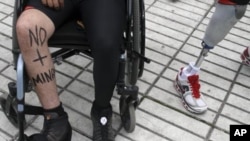The International Campaign to Ban Landmines is urging people all over the world to roll up their pant leg Wednesday in a show of solidarity for victims of these weapons.
The fourth of April, the U.N. International Day for Mine Awareness and Assistance in Mine Action, marks the culmination of a landmine eradication campaign, which kicked off a month ago.
Every year, thousands of people are killed or maimed by mines in more than 60 countries throughout the world.
“I stepped on a landmine in Afghanistan in ’96 when I was just 14 years old…After the explosion, I realized that I would die very soon," said Firoz Alizada.
Alizada did not die. But he woke up to the horror that his left foot had disappeared. His arms and legs were covered with blood.
“It’s a miracle that I survived because it took me more than seven hours to reach to the very first aid that could stop the bleeding," he said. "After almost 13 hours, I reached to a hospital where the operation took place.”
Alizada today is campaign manager for the International Campaign to Ban Landmines, or ICBL. The group and its founding coordinator, Jody Williams, won the Nobel Peace Prize in 1997 for efforts to bring about the Mine Ban Treaty.
Much progress has been made in ridding the world of landmines and reducing casualties from these weapons since the treaty entered into force on March 1, 1999. Eighty percent of countries have banned landmines. Most no longer produce them, and millions of mines have been removed.
Nevertheless, landmines and similar devices continue to wreak havoc on peoples’ lives and livelihoods, said Alizada.
“For example, there is still an average of 12 people who are maimed or killed by mines and explosive remnants of war per day or 4,000 per year, which is a lot, some of whom die on the spot, some of whom die in the hospital or cannot make it. Mines are present and still affect peoples lives in more than 60 countries," he said.
The global Lend Your Leg campaign is the brainchild of the Colombian Human Rights NGO Arcageles. The president and founder of the group, Juan Pablo Salazar, said that Colombia is one of the world’s most mine-affected countries.
Despite this, people do not pay much attention to the issue because it does not affect them, he said, adding the campaign was started to bring the problem home to them in a concrete way.
“Through this simple action of just rolling up your pant leg, we build conscience," Salazar said. "For me, conscience in itself is the objective. Just by creating awareness, amazing things start to happen by themselves.”
To date, 158 countries have joined the Mine Ban Treaty. Major holdouts include the United States, Russia and China. The Obama administration reviewed U.S. policy and said it will not sign the treaty, saying it would not be able to meet its national defense needs or security commitments to allies.
During the past two years, the International Campaign to Ban Landmines says several governments - Burma, Israel, Libya, and probably Syria - have used landmines. In addition, non-state groups in Afghanistan, Colombia, Burma and Pakistan have used them.
ICBL director Kasia Derlicka said in November the group received numerous reports that the Syrian government was laying mines on the border with Lebanon. The information appears to be credible, Derlick said, but cannot be confirmed because of lack of access to the area.
“We have been receiving media reports and information from journalists covering the events in Syria that the government is laying landmines on the border with Turkey now with the same aim as previously, to prevent people fleeing the country and to prevent smuggling of weapons into the country,” she said.
This appears to corroborate a recent report by Human Rights Watch, which claims Syria is placing landmines near its borders with Lebanon and Turkey along routes used by refugees to escape the violence.
Landmine survivors are calling on the international community to eradicate these weapons. They hope the Lend Your Leg for a mine-free world campaign will not end on April 4, but will continue until landmines are gone for good.




